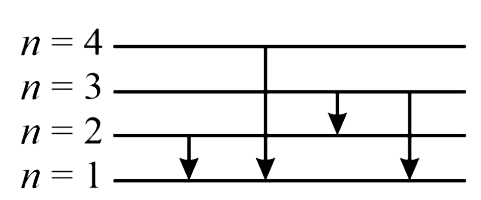Complete Solutions to MULTIPLE CHOICE QUESTIONS of chapter STRUCTURE OF ATOM TEST -1 of Class 12 book with complete answers and questions
| Class 12 | CHEMISTRY |
| Chapter | STRUCTURE OF ATOM TEST -1 |
| NTA MOCK TESTS | MULTIPLE CHOICE QUESTIONS |
| Number Of Questions | 30 |
| Academic Year | 2023-24 |
An excited hydrogen atom emits a photon of wavelength `lambda` in returning to the ground state. If R is the Rydberg constant, then the quantum number n of the excited state is
View SolutionThe hydrogen-like species `Li^(2+)` is in a spherically symmetric state `S_1` with one radial node. Upon absorbing light, the ion undergoes a transition to the state `S_2. " The state " S_2` has one radial node and its energy is equal to the ground state energy of the hydrogen atom.
The state `S_1` is
View SolutionIf the energy of a photon is given as,
`E = 3.03 xx10^(-19) J`, then, the wavelength `(lambda)` of the photon is
View SolutionThe electron energy in a hydrogen atom is given by `E_n = (-2.18 xx 10^(-18))//n^2 J`. Calculate the energy required to remove an electron completely from the `n=2` orbit. What is the longest wavelength of light in cm that can be used to cause this transition?
View SolutionBy calculating the wavelength for the emission transition, if it starts from the orbit having radius 1.3225 nm and ends at 211.6 pm, name the series to which this transition belongs and the region of the spectrum.
View SolutionCalculate the minimum and the maximum number of electrons which may have the magnetic quantum number, `m = +1` and the spin quantum number, `S = -1/2` in chromium (Cr).
View Solutionthe wavelength of light that must be absorbed to excite a hydrogen electron from level `n = 1` to level `n = 2`, will be
`(n = 6.625 xx 10^(-34) Js, C = 3 xx 10^8 ms^(-1))`
View SolutionThe ionization energy of gaseous Na atoms is `495.5 kJ "mol"^(-1)`. The lowest possible frequency of light that ionizes a sodium atom is
`(h = 6.626 xx 10^(-34) Js, N_A = 6.022 xx 10^23 "mol"^(-1))`
View SolutionFor a hypothetical hydrogen like atom, the potential energy of the system is given by `U(r) =(-ke^2)/(r^4)`, where ris the distance between the two particles. If Bohr's model of quantisation of angular momentum is applicable, then the velocity of the particle is given by
View SolutionWhich transition in the hydrogen atomic spectrum will have the same wavelength as the transition, `n = 4 " to " n = 2` of `He^(+)` spectrum?
View SolutionThe energy of second Bohr orbit of the hydrogen atom is `-328 K kJ "mol"^(-1)`. Hence , the energy of fourth Bohr orbit would be
View SolutionThe work function `(phi)` of some metals is listed below. The number of metals which will show photoelectric effect when light of 300 nm wavelength falls on the metals is :

View SolutionWhich of the following statements in relation to the hydrogen atom is correct?
View SolutionAn electron jumps from an outer orbit to an inner orbit with an energy difference of 3.0 eV. What will be the wavelength of the photon emitted?
View SolutionThe shortest wavelength of H atom in Lyman series is x, then the longest wavelength of `He^(+)` in Balmer series is
View SolutionCalculate the angular momentum of an electron in the third orbit of a hydrogen atom, if the angular momentum in the second orbit of the hydrogen atom is L
View SolutionFor a certain atom, there are energy levels A, B, C corresponds to energy values `E_A lt E_B lt E_C` . Choose the correct option if `lambda_1, lambda_2, lambda3` are the wavelength of radiations corresponding to the transition from C to B, B to A and C to A respectively.
View SolutionIf the uncertainty in the position of a particle is equal to its de-Broglie wavelength, the minimum uncertainty In its velocity should be
View SolutionRutherford's `alpha` particle dispersion experiment concludes
View SolutionIf `E_1 ,E_2 and E_3` represent, respectively, the kinetic energies of an electron, an alpha partile and proton , each having the same de Broglie wavelength, then
View SolutionIf the nitrogen atom had electronic configuration `1s^7` it would have energy lower than that of the normal ground state configuration `1s^2 2s^2 2p^3` because the electrons would be closer to the nucleus. Yet `1s^7` is not observed. It violates
View SolutionAccording to the Bohr's Theory, which of the following transitions in the hydrogen atom will give rise to the least energetic photon?
View SolutionThe radiation with maximum frequency is
View SolutionFind out the angular momentum, spherical nodes and angular nodes of `Psi_(210)`
View SolutionTwo electrons are revolving around a nucleus at distances r and 4r. The ratio of their time periods is:
View SolutionWhich of the following is not correct for the velocity of electron?
View SolutionThe radii of two of the first four Bohr orbits of the hydrogen atom are in the ratio 1:4. The energy difference between them may be
View SolutionWhich is the correct relation between energies of one electron species?
`E_1` =Energy of electron in the first Bohr orbit,
`E_2` =Energy of electron in the second Bohr orbit,
`E_3` =Energy of electron in the third Bohr orbit,
`E_4` =Energy of electron in the fourth Bohr orbit.
View SolutionIn a certain electronic transition in the hydrogen atoms from an initial state (1) to the final state (2), the difference in the orbital radius `(r_1 - r_2)` is 24 times the first Bohr radius. Identify the transition.
View SolutionSuppose that a hypothetical atom gives a red, green, blue and violet line in the spectrum. Which Jump according to figure would give off the red spectral line?

View Solution
MULTIPLE CHOICE QUESTIONS questions and complete solutions for chapter STRUCTURE OF ATOM TEST -1 of NTA MOCK TESTS of Class 12